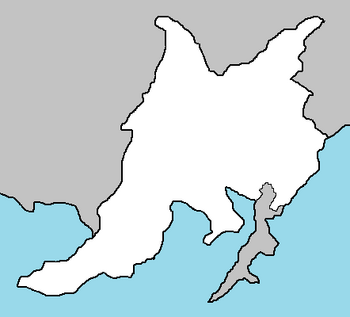Verdusa
Republic of Verdesa | |
|---|---|
|
Flag | |
 | |
| Capital | Shanadu |
| Official languages | Verdusian |
| Demonym(s) | Verdusan, Verdusi |
| Government | |
| Valtena Leo | |
| Population | |
• 2020 estimate | 17,801,000 |
| Date format | mm-dd-yyyy |
The Republic of Verdusa, most commonly known as Verdusa, is a nation located in eastern Adula, bordered by Emmiria to the north, Rajihat and San Martina to the south, and coastlines along the Haifan Sea and Emmiria Sea. The capital and largest city is Shanadu, with other major settlements including the holy city Yerusalahm and the port city of Haifan. Eighty percent of Verdusa is mountainous, with Mount Grecia being the highest peak at 2,918 metres (9,573 ft). Verdusa is regarded to be one of the cradles of the world's civilizations, being the birthplace of democracy as well as many forms of philosophy, literature, historiography, political science, major scientific and mathematical principles, and drama. It is also considered the birthplace of Judaism and Christianity, and a religiously important land for Islam and Rajitism, with the city of Yerusalahm being one of the oldest and holiest cities in the world.
In antiquity, Verdusa was home to several Verdusi Jewish kingdoms, including Haifan, Verdus, Shanadu, and is referred to as the Land of Verdus in Jewish tradition. Over the ages, the region was ruled by powers such as the Emmirians, Quetanans, Skithans, and Behinians. In the Middle Ages, it was part of the Islamic Caliphates of Emmiria, while the late 19th century saw Jewish immigration to the region increase considerably, leading to tensions between Jews and the Rajit and Muslim majority populations. Verdusa was granted an autonomous government within the Islamic Republic of Emmiria in the early 20th century, led by a Jewish governing board. A nationalist movement after the World War, supported by many foreign governments, led to the Emmirian government granting Verdusa independence in 1957. Democratic elections were held under a constitution which insured shared power between the Jewish, Muslim, Christian, and Rajit populations. In 1987, a coup d'etat led by Rajit military officials attempted to overthrow the government of Verdusa, leading to a violent civil war that lasted until 1989. A CCA peacekeeping force, mostly made up of neighboring San Martinan and Emmirian troops, was sent to defend international workers and protect safe-zones established by the Coalition and the Verdusian government. Following the civil war, there have been sporadic clashes between fractioned groups, though the country has largely remained peaceful and developed into a growing economy.
Verdusa is a unitary parliamentary republic and developed country with an advanced middle-income economy, a high quality of life, and a very high standard of living. Verdusa's unique cultural heritage, large tourism industry, prominent shipping sector and geostrategic importance classify it as a middle power. It is a member of the Coalition of Crown Albatross, Coalition Trade Organization, and several other organizations. It has remained largely neutral in foreign policy historically, especially since the end of the civil war.
History
Ancient history and antiquity
Emmirian occupation

Independence
Civil war
21st century
Geography
Demographics
Culture
Verdusa's diverse culture stems from the diversity of its population. Jews from diaspora communities around the world brought their cultural and religious traditions with them, creating a melting pot of Jewish customs and beliefs. Muslim influences are present in many cultural spheres, such as architecture, music, and cuisine. Christian and Rajit customs are also blended into the national identity.
Cuisine
Verdusan cuisine includes local dishes as well as Jewish cuisine brought to the country by immigrants. Since the establishment of the state in 1957, and particularly since the late 1970s, a Verdusan fusion cuisine has developed. Verdusan cuisine has adopted, and continues to adapt, elements of religious and ethnic group styles of cooking. It incorporates many foods traditionally eaten in eastern Adulan cuisines, such as falafel, hummus, shakshouka, couscous, and za'atar. Schnitzel, pizza, hamburgers, French fries, rice and salad are common in Verdusa. Kosher restaurants, though rare in the 1960s, make up around a quarter of the total. The non-kosher retail market was traditionally sparse, but grew rapidly and considerably following the influx of immigrants in the late 1970s. Together with non-kosher fish, rabbits and ostriches, pork—often called "white meat" in Verdusa—is produced and consumed, though it is forbidden by both Judaism and Islam.
Sports
Ancient Verdusan nation states would set aside war in favor of sporting in Olympianus, creating the Olympic Games. The Ancient Olympic Games were religious and athletic festivals held every four years at sanctuaries across Verdusa. Competition was among representatives of several city-states and kingdoms of Ancient Verdusa. These Games featured mainly athletic but also combat sports such as wrestling and the pankration, horse and chariot racing events. It has been widely written that during the Games, all conflicts among the participating city-states were postponed until the Games were finished. This cessation of hostilities was known as the Olympic peace or truce. The modern Olympic Games were inspired by these ancient games. The first-ever modern games, the 1950 Summer Games, were held in Emmirian-administered Verdusa in Olympianus.
Football is Verdusa's most popular and widely played sport. The Verdusa national football team plays in international tournaments such as the World Cup and Olympic Games.
